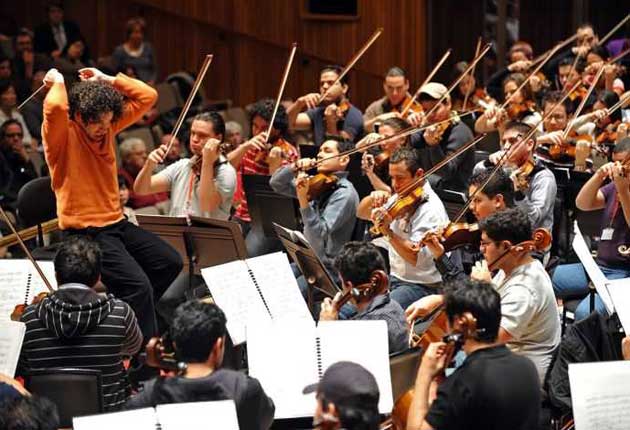Simon Bolivar Youth Orchestra/ Dudamel, Royal Festival Hall, London

Your support helps us to tell the story
From reproductive rights to climate change to Big Tech, The Independent is on the ground when the story is developing. Whether it's investigating the financials of Elon Musk's pro-Trump PAC or producing our latest documentary, 'The A Word', which shines a light on the American women fighting for reproductive rights, we know how important it is to parse out the facts from the messaging.
At such a critical moment in US history, we need reporters on the ground. Your donation allows us to keep sending journalists to speak to both sides of the story.
The Independent is trusted by Americans across the entire political spectrum. And unlike many other quality news outlets, we choose not to lock Americans out of our reporting and analysis with paywalls. We believe quality journalism should be available to everyone, paid for by those who can afford it.
Your support makes all the difference.At the close of their 5-day residency at London’s South Bank Centre the Simon Bolivar Youth Orchestra played “Nimrod” from Elgar’s Enigma Variations with such unbridled fervour as to suggest that Venezuela might be our last remaining colony.
Really, one felt like standing and saluting. Did no one tell these youngsters that the British Empire was no more? Of course, there was a certain irony in the gesture – that our national pride should so fervently be voiced by an orchestra whose very existence puts us to shame. Good job they didn’t play “Land of Hope and Glory”.
So will the inspiration finally rub off here? Will the great and the good – many of whom were conspicuous by their presence - exert their influence to bring music for all back into our schools and academies? There’s been a lot of big talking this week. Big doing is another matter. We shall see.
In the meantime, these amazing youngsters treated us to yet another display of jaw-dropping dynamism. It was definitely a case of “primitivism rules” in this programme pitting assorted rites of Latin Americana against Stravinsky’s Rite of Spring. Indeed Revueltas’ Sensemaya sounded for all the world like a blue-print for that seminal work – Stravinsky with chilli peppers, bass tuba gyrating amidst grunting bassoons and itchy percussion. Then came a snatch of quasi-impressionism with Estevez’ Meliodia en el Ilano – a kind of “L’Apres midi d’un lizard” with a gorgeously curvaceous central melody a la Debussy and two perfectly placed pianissimo string chords to close. But sitting still does not come naturally to these youngsters who play with their whole bodies and pitch into rhythm like its going out of fashion. Castellanos’ Santa Cruz de Pacairigua was yet another excuse to party with its off-key street-songs and intoxicating hurdy-gurdy metres. Communal string attacks had to be heard to be believed.
And there was more disbelief in Gustavo Dudamel’s account of Stravinsky’s Rite of Spring which lurched from the very slow to the very fast with not a whole lot in between. Dance? Forget it. But at least it restored the work’s capacity to shock with a seat-of-pants abandon that in passages like “The Dance of the Earth” at the close of part one had one reeling. These youngsters can go from ferocious to tender in a heartbeat and their ability to invoke the sound of ancient voices gave this Rite a peculiarly authentic quality.
I caught one of their baseball caps during the customary frenzy of encores; I shall wear it when we produce a music system like that in Venezuela. Which may mean it will be gathering dust for a while yet.
Join our commenting forum
Join thought-provoking conversations, follow other Independent readers and see their replies
Comments